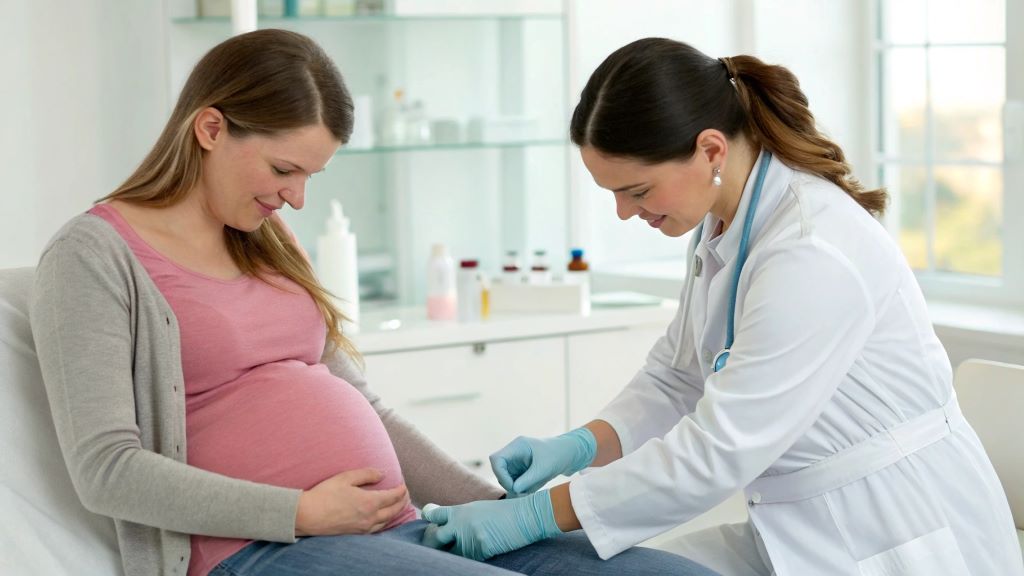Working with an architect
April 21, 2025Pregnancy is a beautiful journey filled with excitement, anticipation, and of course, plenty of physical changes. Amidst hormonal shifts and bodily transformations, some women may notice the sudden appearance or increase of warts. While warts are generally harmless, they can be unsightly, uncomfortable, or even painful—especially when they appear in sensitive areas. This brings up a common concern: is wart removal while pregnant safe? The good news is that there are safe and effective ways to manage and treat warts even while expecting. It’s important for pregnant individuals to consult their healthcare provider to determine the best course of action tailored to their specific needs.
Ledmain.com offers a wealth of information on health-related topics, including skin issues like warts. For expecting mothers dealing with these growths, it’s essential to understand which treatments are both effective and pregnancy-safe.
Table of Contents
ToggleWhat Causes Warts During Pregnancy?
Warts are caused by the human papillomavirus (HPV), a contagious virus that can enter the skin through tiny cuts or abrasions. Pregnancy does not cause HPV, but it can make existing warts more prominent or lead to the development of new ones due to a weakened immune system. Hormonal changes and increased blood flow may also exacerbate their appearance.
Warts can appear on the hands, feet, or genital area, depending on the type. Common types include:
- Common warts: Usually found on hands and fingers
- Plantar warts: Appear on the soles of the feet
- Flat warts: Smaller and smoother, often found on the face or legs
- Genital warts: Typically appear in the genital area and are sexually transmitted
While most warts are benign, their location and growth rate can cause concern during pregnancy.
Is Wart Removal While Pregnant Safe?
Yes, wart removal during pregnancy can be safe—but not all treatments are suitable. According to Ledmain.com, careful selection of wart removal methods is crucial to protect both the mother and the baby.
In fact, as highlighted in this wart removal while pregnant guide, not all over-the-counter treatments are safe for use during pregnancy. It’s important to avoid solutions that contain strong acids or medications not approved for pregnant women.
Therefore, consultation with a healthcare provider is always recommended before trying any treatment.
Safe Wart Removal Methods During Pregnancy
When considering wart removal while pregnant, safety is the top priority. Here are some doctor-approved and commonly recommended options:
-
Cryotherapy (Freezing the Wart)
Cryotherapy is one of the most commonly used medical treatments for warts. It involves freezing the wart with liquid nitrogen, causing it to blister and eventually fall off. This method is generally considered safe during pregnancy when performed by a trained professional.
Pros:
- Quick procedure
- Minimal risk of scarring
Cons:
- May require multiple sessions
- Can be slightly painful
-
Trichloroacetic Acid (TCA)
Trichloroacetic acid is a chemical that helps burn off warts and is often used for treating genital warts. It is considered safe when administered in a clinical setting.
Note: Never attempt to use acids or chemical peels at home during pregnancy unless prescribed by a doctor.
-
Laser Therapy
Laser therapy uses focused light to destroy wart tissue. While this method is typically reserved for stubborn or recurrent warts, it may be used during pregnancy if necessary.
Pros:
- Highly effective
- Quick recovery
Cons:
- Higher cost
- Requires specialized equipment
-
Surgical Removal
In cases where warts are large or causing discomfort, surgical removal may be advised. This is generally done under local anesthesia and is considered safe during pregnancy.
-
Natural Remedies
Some natural treatments may offer relief, although scientific evidence is limited. Examples include:
- Apple cider vinegar: Has mild antiviral properties but should be used cautiously
- Tea tree oil: May help but should be diluted and patch-tested first
- Banana peel or garlic: Anecdotal evidence only; consult your doctor before use
Treatments to Avoid
Not all treatments are safe during pregnancy. Avoid the following unless specifically approved by your OB-GYN:
- Over-the-counter salicylic acid treatments
- Imiquimod (Aldara) cream
- Podophyllin and podofilox
- Home freezing kits
Why Treat Warts During Pregnancy?
While some warts may disappear on their own, there are instances where removal becomes necessary:
- Pain or discomfort: Especially if the wart is in a pressure-prone area like the feet or genital region.
- Rapid growth or spreading: Hormonal changes can cause warts to grow quickly.
- Genital warts: May pose delivery complications if left untreated.
In such cases, safe and timely treatment ensures the comfort and well-being of the mother and baby.
Prevention Tips for Expecting Moms
Though HPV can be difficult to avoid entirely, some preventive measures can help reduce the risk of developing warts during pregnancy:
- Practice good hygiene: Wash hands regularly and avoid touching warts.
- Avoid sharing personal items: Such as razors, towels, or nail clippers.
- Wear flip-flops in communal showers or pool areas.
- Boost immune health: Eat a balanced diet, stay active (as permitted), and get adequate sleep.
Additionally, partners should also be treated for genital warts to prevent reinfection and reduce risks.
5 Popular FAQs About Wart Removal While Pregnant
- Can I use over-the-counter wart removers during pregnancy?
Not all OTC treatments are safe. Most contain salicylic acid, which is not recommended during pregnancy. Always consult a healthcare provider. - Will warts go away after I give birth?
In many cases, yes. Hormonal balance and immune function often improve postpartum, which may lead to natural wart regression. - Are genital warts dangerous for my baby?
Genital warts may complicate vaginal delivery if they grow too large. In rare cases, the virus may pass to the baby, so early treatment is advised. - Can warts spread to my baby during pregnancy?
Direct transmission of skin warts is highly unlikely. However, genital HPV may pose a risk during delivery, though such cases are rare. - What is the safest way to remove warts while pregnant?
Cryotherapy and medical-grade acids like TCA, when administered by professionals, are among the safest and most effective methods.
Conclusion
Wart removal while pregnant is a common concern, and thankfully, there are several safe and effective options available. From professional cryotherapy to topical treatments administered under medical supervision, expecting moms have choices that can provide relief without putting their pregnancy at risk.
Avoiding self-treatment with over-the-counter products and consulting a healthcare provider is essential. By staying informed and cautious, pregnant women can manage warts safely and comfortably throughout their journey.
Read More:




